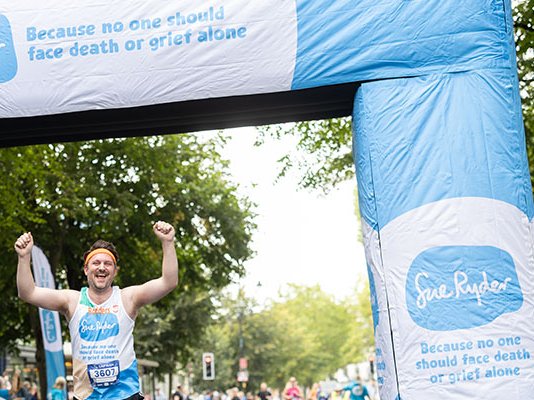Sue Ryder South East
Sue Ryder offers a range of hospice and community nursing services in Berkshire West and South Oxfordshire, including Reading, Newbury, Wokingham, Didcot, Wallingford and Henley, and many more local communities in between.
To contact our services in South Oxfordshire, please email enquiries.southoxfordshire@sueryder.org. The email for our Berkshire West services is below.

Our services
- Hospice at Home
- Virtual Ward Service - providing hospital-level care at home
- Specialist Community Nursing Service
- Care coordination service
- 24/7 clinical advice line for patients and healthcare professionals
- Inpatient care
- Day services
- Therapies, including lymphoedema service in Berkshire West
- Wellbeing and community support service
- Sue Ryder community teams are based in centres across the South East, including Theale, West Berkshire Community Hospital, Wallingford Community Hospital and Wallingford. Sue Ryder inpatient care is provided at Sue Ryder Duchess of Kent Hospice.
Address
Sue Ryder Duchess of Kent Hospice
22 Liebenrood Road
Reading
RG30 2DX
United Kingdom
About Sue Ryder South East
Hospice care is the treatment and support we offer to people with life-limiting conditions.
Our team of Sue Ryder Nurses, doctors, healthcare assistants, physiotherapists and occupational therapists combine specialist medical care for managing pain and other symptoms, with wellbeing support. Everyone works seamlessly together to support you and your family through the most difficult times.
There are a number of ways our expert teams can care for you.
If you are comfortable and supported at home and prefer to stay there, we provide a Hospice at Home service, specialist Community Nursing, day services, care coordination and a 24/7 clinical advice line.
You might stay with us to receive inpatient care at our unit in Reading, or a specialist palliative care inpatient beds at Wallingford Community Hospital.
Whether at home or as an inpatient, wherever we see you, Sue Ryder staff provide you with compassionate, expert care.
Care coordination
Our Single Point of Access service provides support in coordinating care for patients. Please call 0118 950 5276.
We speak to patients, families and carers, and healthcare professionals.
24/7 clinical advice line
Existing Sue Ryder patients, their carers, family members or healthcare professionals supporting them can also access the Sue Ryder 24/7 clinical advice line for specialist advice and support. Call 0118 950 5276 at any time.
You’ll receive expert advice from a team of specialist Sue Ryder Nurses and consultants who work with GPs, community nursing teams and other palliative care providers.
Making a referral
If you are a patient, a healthcare professional, such as your GP or hospital consultant, can refer you to our services. If you are discharged but then later need additional support, you can be referred back to our care at any time.
If you are a healthcare professional, you can make a referral by downloading our Sue Ryder South East referral form and emailing it securely to sryc.seregion@nhs.net.
Alternatively, you can call 0118 950 5276 to discuss a potential referral and find out more about how our care could help your patient.
Please note: To help our specialist team triage your referral appropriately, please provide as much information as possible when completing the form. You can now also select the services your patient requires. Sue Ryder aims to review and triage all referrals within 24 hours of receipt. All referrals will be prioritised using the Nexus Run-PC triage tool.
194.9 KB · DOCX
Supporting Sue Ryder
We need to raise 70% of the funds required to run all of Sue Ryder’s palliative care services, and we can’t do that without the continued generosity of our supporters.
If you would like to find out more about how you can support us, please call our local fundraising team on 0118 9550 433 or email thamesvalley.fundraising@sueryder.org.
More ways to show your support



